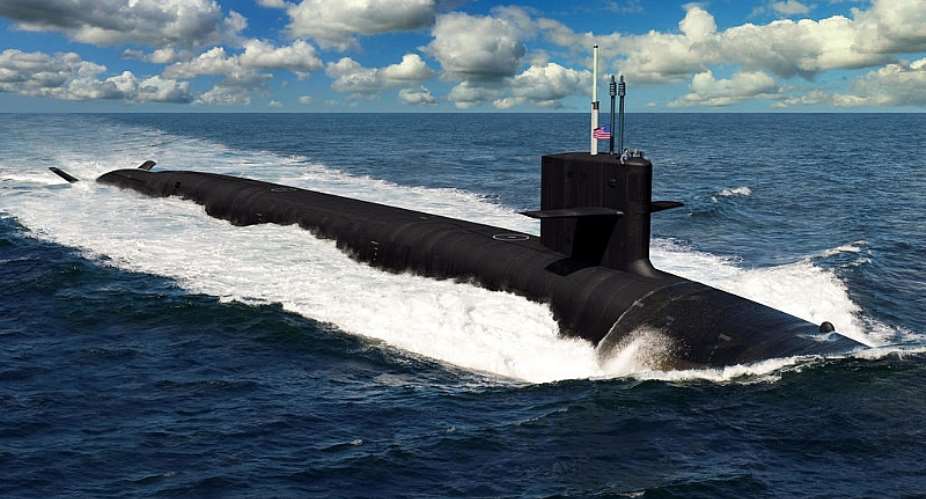As the world struggles with the coronavirus epidemic, there are still pockets of people who know nothing of the problem. Submarine crews are probably among them. Purposely shielded from worldly worries to ensure undivided focus on their mission of nuclear deterrence, they are unlikely to have been told how the disease is turning life upside down.
Crew aboard ballistic submarines are habitually spared bad news while underwater. This is to avoid undermining their morale, according to current and former officers who served aboard France's nuclear-armed subs. So those who left port before the virus spread around the globe are likely to have been kept in the dark about the extent of the crisis by their commanders, they say.
"They won't know,” said retired Admiral Dominique Salles, who commanded the French ballistic submarine squadron from 2003 to 2006. “The boys need to be completely available for their mission.”
Speaking to the Associated Press newswire service, Salles said he believes submariners will, in all probability, be told of the pandemic only as they head back to port, in the final two days of their mission.
The need to be kept in the dark
“Those who are at sea don't need this information," said Salles, who also commanded the nuclear-armed French submarine “L'Inflexible."
“The commander, I think, is doubtless informed about what is happening. I don't think he'll have all the details," he said.
The French navy won't divulge what has or hasn't been said to submarine crews. Nor will it say whether any of the four French ballistic submarines, each with 16 missiles capable of carrying six nuclear warheads, left harbour before France instituted a nationwide lockdown on 17 March.
“Because the deterrent is wrapped in a bubble of protection and confidentiality, it is impossible to know whether the crews are informed or not of this situation,” French navy spokesman Lieutenant Commander Olivier Ribard said.
French submarine missions last 60 to 70 days. So a crew that left at the end of February wouldn't be expected back before the end of April.
For submariners, return could be a shock
“They won't have experienced the crisis as we did, with a bit of fear, the lockdown. So for them it will be quite a surprise. They will learn the history, but it will be a history that is related to them," said a serving officer who was the doctor on a ballistic submarine.
“All events that could affect or change the morale of the crew members are kept from them," he said. “Since there is no internet, no radio and no television on board, the only news you get comes from information received by the commander, and the commander filters the messages.
“The only place where you are really cut off from all information is underwater, because even on a vessel in space there is still the radio, television, the internet," he said.
Leaving families in lockdown is hard for submariners
Salles said the situation now will be toughest for any crews that leave harbour in the weeks ahead, because they'll know they are leaving loved ones in the midst of the pandemic and, possibly, still living in lockdown.
Salles said he believes those crews will get regular coronavirus updates, but won't be told of any family deaths until they are on the return leg of their mission, heading for the l'Ile Longue submarine base near Brest in Brittany.
Salles was at sea in a sub when his father died. The news was kept from him until he had finished his 60-day mission.
“No matter how serious an event is, there is nothing a submariner can do about it. And since he cannot do anything, better that he know nothing," Salles said. “They know that they won't know, and accept it. It's part of our deal.”
(With AP)





 There’s nothing you can do for us; just give us electricity to save our collapsi...
There’s nothing you can do for us; just give us electricity to save our collapsi...
 Ghanaian media failing in watchdog duties — Sulemana Braimah
Ghanaian media failing in watchdog duties — Sulemana Braimah
 On any scale, Mahama can't match Bawumia — NPP Youth Organiser
On any scale, Mahama can't match Bawumia — NPP Youth Organiser
 Never tag me as an NPP pastor; I'm 'pained' the 'Akyem Mafia' are still in charg...
Never tag me as an NPP pastor; I'm 'pained' the 'Akyem Mafia' are still in charg...
 Your refusal to dedicate a project to Atta Mills means you never loved him — Kok...
Your refusal to dedicate a project to Atta Mills means you never loved him — Kok...
 2024 elections: I'm competent, not just a dreamer; vote for me — Alan
2024 elections: I'm competent, not just a dreamer; vote for me — Alan
 2024 elections: Forget NPP, NDC; I've the Holy Spirit backing me and nothing wil...
2024 elections: Forget NPP, NDC; I've the Holy Spirit backing me and nothing wil...
 2024 elections: We've no trust in judiciary; we'll ensure ballots are well secur...
2024 elections: We've no trust in judiciary; we'll ensure ballots are well secur...
 Performance tracker: Fire MCEs, DCEs who document Mahama's projects; they're not...
Performance tracker: Fire MCEs, DCEs who document Mahama's projects; they're not...
 Train crash: Railway ministry shares footage of incident
Train crash: Railway ministry shares footage of incident
